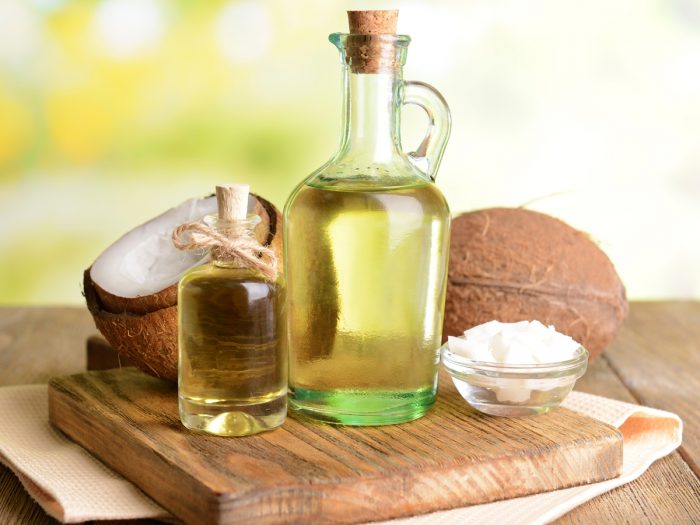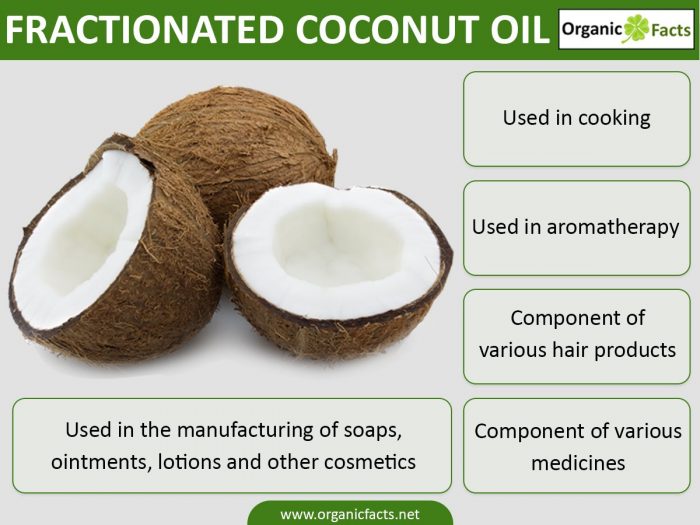Fractionated coconut oil is a fraction of coconut oil where the other fatty acids are separated from the oil for different uses. It is predominantly composed of saturated fatty acids, and it is rich in medium-chain fatty acids. Being rich in saturated fatty acids, it is highly stable.
Human nature is such that it is never satisfied or contented. It is always looking for more. Therefore, we started looking for a more stable form of oil which would be more beneficial for health as well, in addition to having a very long shelf life and all the qualities of coconut oil. [1]
What is Fractionated Coconut Oil?
Fractionated coconut oil is a fraction of the coconut oil from which almost all the long-chain triglycerides are removed, thus leaving mainly the medium-chain triglycerides (MCTs) and making it an absolutely saturated oil. This saturation gives it a very long shelf life and greatly increased stability. [2]
In addition, fractionating raises the comparative concentration of capric acid (C8) and caprylic acid (C10), thus giving it more of antioxidant and disinfecting effect.

Raw coconut oil and diced coconut Photo Credit: Shutterstock
Benefits
The MCT’s in fractionated coconut oil has been associated with a range of benefits. Let’s have a look at them in detail.
Weight Loss
Consumption of MCT oil as part of a weight-loss regime improved weight loss according to a human study report. This study was published in The American Journal of Clinical Nutrition. Small changes in the quality of fat intake are useful to promote weight loss. [3]
Improves Exercise Performance
A 2018 study provides the first evidence that MCT oil as a food supplement, preserves impairment in exercise performance and muscle function. It also reveals the novel role of MCT in exercise and fitness, providing evidence for treating muscle dysfunction and exercise impairment in patients by taking MCT as a dietary supplement. [4]
Effective in Epilepsy Treatment
According to a case study report in Neurological Medicine journal, it can be concluded that MCT oil supplementation to the regular diet provides better seizure control in selective patients. It is a more tolerable alternative to the standard ketogenic diet. [5]
Preparation
For this, hydrolysis of coconut oil is first carried out. Then, the product is passed through steam distillation to obtain it. The result is a thin oil full of medium-chain triglycerides.
Composition
Fractionated coconut oil is predominantly composed of two main medium-chain fatty acids (MUFAs). They are
- Capric or octanoic acid
- Caprylic or decanoic acid
Uses of Fractionated Coconut Oil
Fractionated coconut oil comes in three different forms for three different uses. Being thin and stable, it has plenty of uses which can be broadly categorized in the following applications.
Cosmetics and Aromatherapy
Fractionated coconut oil is widely used in the preparation of soaps, lotions, ointments, and other cosmetics. It is used as a carrier oil since it facilitates the absorption of other oils and herbal extracts. It is also used in a number of hair care applications.
Medicines
Well-known as MCT oil, it is used due to its antiseptic and disinfectant properties and is used as a common dietary supplement. It is also used in weight loss and regulating cholesterol levels. [6] [7]
Culinary Usage
Found in the form of liquid coconut oil, it is edible and is used in cooking, as it does not go rancid easily.

Fractionated coconut oil is used in making soaps and ointments. Photo Credit: Shutterstock
Cost
Since fractionated oil involves a lot more processing (such as hydrolysis and steam distillation) than ordinary coconut oil, it is slightly more expensive. However, the additional cost does have its own benefits and justifications. Keeping in mind it’s extremely long shelf life, stability, and rancidity-resistant properties, it is well worth the price you pay.
